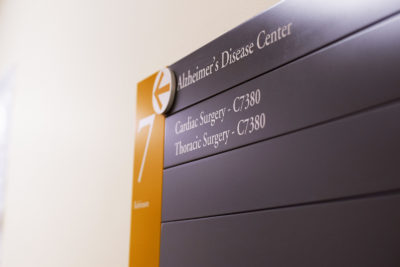
The National Institutes of Health and the National Institute on Aging renewed a three-year $5.4 million research grant for the Boston University Alzheimer’s Disease Center on Aug. 25. The grant will allow the center to continue its research on ways to manage and reduce the effects of Alzheimer’s disease, according to ADC Associate Director Andrew Budson.
The kind of work that researchers at the ADC do on a daily basis varies and depends largely on grants from organizations like the NIH, which has supported the ADC for the last twenty years, said Budson. Despite the continuous support the ADC has received over the years, researchers like himself were uncertain about the future of the center’s funding.
“In this day and age where there are cuts across the board in many federal agencies,” he said, “it is never a sure thing that one will receive a grant … so we were very glad when we did receive it.”
The grant money awarded to the ADC is crucial to maintaining the high quantity and quality of the research that is done at the center.
“If there was no grant money, the BU ADC would be unable to function as a research center,” said Christina DiTerlizzi, the assistant director of the ADC Education Core. “We would be unable to run clinical trials, recruit participants, provide data to investigators from around the world, and would be unable to educate professionals and communities about Alzheimer’s disease.”
Alzheimer’s is “an irreversible, progressive brain disorder that slowly destroys memory and thinking skills and, eventually, the ability to carry out the simplest tasks,” DiTerlizzi explained. Because it is a progressive neurodegenerative disorder, the symptoms worsen over time, imposing significant human and economic costs for those affected and their families.
The ADC will be using the grant money over the course of the next three years for three different but interconnected purposes, according to Budson.
“The first,” Budson said, “is to continue our collaboration with national and international projects aimed at better understanding exactly the different triggers that can cause Alzheimer’s disease … and most importantly, to work toward treatments and cures of the disease.”
Secondly, some of the money will go to the ADC’s own investigator-initiated study, which aims to find ways to better understand Alzheimer’s and its potential treatment options.
“There are studies,” Budson said, “such as the one going on in my laboratory, where we work to use computer-based memory tests to develop new strategies and memory aids that can be used to improve memory in individuals’ day-to-day lives.”
“Third, he added, the grant will allow the researchers to “continue our pioneering work on understanding the cause and features of chronic traumatic encephalopathy.”
Several BU students said they were happy to see that the university’s research efforts are being supported, considering the severity of Alzheimer’s disease and the importance of the work being done at the ADC.
Taylor Reed, a sophomore in the College of Arts and Sciences studying neuroscience, said she is glad to see the government is supporting research because it can help everyone, including students like herself.
“It’s a good thing,” Reed said of the funding. “Students can get more involved. There’s a lot of volunteering options [at the ADC] … It gets students more involved and there’s a lot more research.”
Rui Li, a first-year graduate student in CAS, said she believes the grant money will be used well at the ADC.
“I think the more money you get to do research, the better,” Li said. “And of course, it’s on the basis that the money goes to the right people’s hands and that they use it effectively. And if there’s no other people who can better use the money, then I think it’s good.”
Lucas LaVoie, a freshman in the College of Fine Arts, said he trusts that the ADC will use the grant money efficiently and effectively.
“I know that BU puts a lot of money into research and development for medicines for pretty bad diseases,” LaVoie said, “so I feel like they’ll probably do the right thing with [the grant] and continue some really good research.”


















































































































